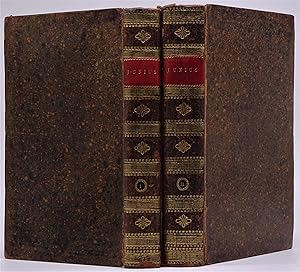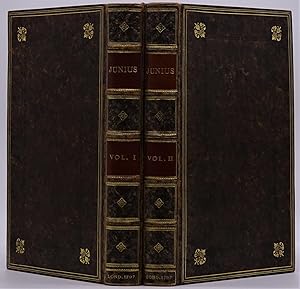Attributed Junius (9 results)
FeedbackSearch filters
Product Type
- All Product Types
- Books (9)
- Magazines & Periodicals (No further results match this refinement)
- Comics (No further results match this refinement)
- Sheet Music (No further results match this refinement)
- Art, Prints & Posters (No further results match this refinement)
- Photographs (No further results match this refinement)
- Maps (No further results match this refinement)
- Manuscripts & Paper Collectibles (No further results match this refinement)
Condition Learn more
- New (No further results match this refinement)
- As New, Fine or Near Fine (1)
- Very Good or Good (3)
- Fair or Poor (No further results match this refinement)
- As Described (5)
Binding
- All Bindings
- Hardcover (7)
- Softcover (No further results match this refinement)
Collectible Attributes
- First Edition (1)
- Signed (No further results match this refinement)
- Dust Jacket (2)
- Seller-Supplied Images (8)
- Not Print on Demand (9)
Language (1)
Free Shipping
Seller Location
Seller Rating
-
Junius. Stat nominis umbra
Published by T. Bensley, 1805
Seller: Neverland Books, Waalre, Netherlands
First Edition
£ 22.76
Convert currency£ 30.25 shipping from Netherlands to U.S.A.Quantity: 1 available
Add to basketHardcover. Condition: Good. 1st Edition. "Junius. Stat nominis umbra" by Junius ( attributed to Sir Phllip Francis ) T. Bensley, London - 1805 new edition - 284p, 18cmx15cm - with engraved frontispiece and plates - Vol II - condition: good, with leather boards and spine, with rubbing and wear, engraved plates and frontispiece, The letters of "Junius," originally appearing in the "Public Advertiser" from November of 1768 to January of 1772, represent one of the great mysteries of English literature. No author ever claimed credit for these letters, though they were ascribed to every prominent Whig of the period. Sir Philip Francis (1740-1818), who was a clerk in the War Office when the "Junius" letters were written, is generally considered to be the mystery writer, though he denied this association to the end of his life.
-
Junius. Stat Nominis Umbra. Two Volumes
Published by Printed By T. Bensley, for Vernor and Hood, London, 1797
Seller: Dale Steffey Books, ABAA, ILAB, Bloomington, IN, U.S.A.
Hardcover. Condition: Very Good. Dust Jacket Condition: No Jacket, As Issued. Later Edition. Two volumes in contemporary speckled calf, gilt back with red morocco label. Very Good, prior owner name front paste downs, light wear to boards, toning at end pages from binding, scattered light toning throughout, joints showing wear with front joint Vol. I just starting to loosen. Size: 8vo - over 7¾" - 9¾" tall. Book.
-
Junius. Stat Nominis Umbra. Two Volumes
Published by Printed by T. Bensley for Vernor and Hood, London, 1797
Seller: Dale Steffey Books, ABAA, ILAB, Bloomington, IN, U.S.A.
Hardcover. Condition: Very Good. Dust Jacket Condition: No Jacket, As Issued. Later Edition. Two volumes in late 19th c. mottled calf, gilt backs with red morocco labels, all edges gilt, frontispiece portraits, engraved title pages. Bearing the small bookplate of Alfred Sutro, English author, dramatist, and translator of the works of Maurice Maeterlinck, Vol I, 1799, Vol. II, 1797, although both tails dates read 1797.Very Good, front joint Vol. I cracked and barely holding, joints both vols. show wear, pp 204-236 Vol. II have creases along fore edge, Size: 8vo - over 7¾" - 9¾" tall. Book.
-
Junius | Stat Nominis Umbra | The Letters of Junius [Two Volumes]
Published by London Printed by T. Bensley for Vernor, and Hood Poultry June 4th . Two Volumes. London 1805., 1805
Seller: Little Stour Books PBFA Member, Canterbury, United Kingdom
Association Member: PBFA
£ 150
Convert currency£ 20 shipping from United Kingdom to U.S.A.Quantity: 1 available
Add to basketBeautifully rebound in full matching soft scarlet calf covers by Henry Sotheran & Co., Piccadilly, gilt lettering and five raised bands to the spines, elaborate inner gilt dentelles, all page edges gilt, marble paper end papers. 8vo 8'' x 5¼'' xxxii, 252; iv, 284 [pp]. Frontispiece and additional title page to each volume along with 19 full-page engravings. Only very minimal foxing inside the end papers, the plates being particularly clean and free from any marks, discoloration or foxing. In near Fine condition. Member of the P.B.F.A. ITALY (History & Culture).
-
Stat Nominis Umbra.
Published by LondonPrinted by T. Bensley ., 1801
Seller: Robert Frew Ltd. ABA ILAB, London, United Kingdom
£ 200
Convert currency£ 10 shipping from United Kingdom to U.S.A.Quantity: 1 available
Add to basket2 vols. pp.xxxv+274; v+[i]+318+[2, ads]. Contemporary mottled calf, spines framed with gilt border, smooth spines with gilt decoration and two black morocco labels, marbled endpapers and edges. Engraved title-page dated dated 1797. 2 engraved titles, 21 engraved portraits (including 2 frontispieces), and 69 vignettes (some repeats). Upper joint starting and with tiny hole, others a bit tender, generally a beautifully bound set in very good condition. A handsome set of these controversial political letterse which in the past have been attributed to Burke, Paine, and Franklin. The letters of "Junius," originally appearing in the "Public Advertiser" from November of 1768 to January of 1772, represent one of the great mysteries of English literature. No author ever claimed credit for these letters, though they were ascribed to every prominent Whig of the period. Sir Philip Francis (1740-1818), who was a clerk in the War Office when the "Junius" letters were written, is generally considered to be the mystery writer, though he denied this association to the end of his life. This edition prints Junius's "Dedication to the English Nation", boldly stating support for republicanism and freedom of the press. Junius's letters are now considered "a classic of English political commentary" characterised by "high Whig philosophy" combined with "one of the most effective uses of slanderous polemic ever employed" (ODNB) in attacking the policies of George III and his government under the Duke of Grafton and Lord North.
-
Letters of Junius | Stat nominis umbra
Published by Printed By T. Bensley, for Vernor and Hood, Birchin Lane, London . 1797., 1797
Seller: Little Stour Books PBFA Member, Canterbury, United Kingdom
Association Member: PBFA
£ 250
Convert currency£ 20 shipping from United Kingdom to U.S.A.Quantity: 1 available
Add to basketUniform matching hard back binding in nineteenth century half dark green leather with wide fold-ins, the spine divided into six panels, lettered in the second and fourth, tooling to the others, dated at the foot, tea green cloth sides, all page edges gilt, pale blue and rose marble paper end sheets. 8vo. 8½'' x 5½''. Junius was the pseudonym of a writer who contributed a series of political letters critical of the government of King George III to the Public Advertiser, from 21 January 1769 to 21 January 1772 as well as several other London newspapers such as the London Evening Post. The collection of private and open letters were from an anonymous polemicist (Junius) claimed by some to be Philip Francis, as well as other letters in-reply from people to whom Junius had written between 1769 and 1772. The collection was published in two volumes in 1772 by Henry Sampson Woodfall, the owner and editor of a London newspaper, the Public Advertiser. The collection includes 69 letters, 29 to the Printer of the Public Advertiser originally intended for public readership, with the remaining 40 to individuals, then made public. It included letters written by Philo Junius, who, some say, was Junius himself. Contains Engraved title pages (xl), 325; 366 pp with 15 full-page monochrome historical figure engravings. The engravings are without tissue papers and have left off-setting to the text block opposite, sun darkening of the leather down the spines. Interesting newspaper article from the 'Leeds Mercury' of April 24th 1901 concerning 'The Household of Junius'. Heavy two volume set weighing 2 kg, extra postage and insurance will be requested over and above our default setting for destinations outside of the UK. Member of the P.B.F.A. LITERATURE BEFORE 1800.
-
Stat Nominus Umbra [Letters of Junius]
Published by T. Bensley, London, 1799
Seller: Riverrun Books & Manuscripts, ABAA, Ardsley, NY, U.S.A.
Two volumes, 8vo (212 x 125mm). 21 engraved portraits, vignettes in text. Contemporary full green straight-grained morocco gilt, all edges gilt (sympathetically rebacked to style, some rubbing to joints and extremities, light wear along fore-edges, mottling to leather). First complete Bensley illustrated edition.
-
[Letters of] Junius. Stat Nominis Umbra.
Published by T. Bensley, London, 1799
Seller: Jeffrey H. Marks, Rare Books, ABAA, Rochester, NY, U.S.A.
2 vols. Illustrated from engravings. 8vo, recent 3/4 crimson morocco over cords; a.e.g. A clean fine set.
-
Princeps. ex Sylvestri Telii Fulginatis [Machiavelli] (+) Vindiciae contra tyrannos [Brutus].
Seller: Herman H. J. Lynge & Søn ILAB-ABF, Copenhagen, Denmark
£ 3,578.01
Convert currencyFree shipping from Denmark to U.S.A.Quantity: 1 available
Add to basket[Both works:] (No place but possibly Basel, no printer), 1589. 8vo. In contemporary limp vellum. Extremities with wear and soiling, repair to upper part of spine and back board. Dampstain throughout, primarily affecting first and least leaves. A few worm-tracts throughout, occassionally touching text. (16), 201, (7)" 331, (3) + portrait. A most interesting sammelband containing two works on political theory, offering contrasting views on rulers legitemacy and how to exercise power. The two works are: Third Latin edition translated by Sylvestre Tellio of Machiavelli's foundational work of modern political philosophy "The Prince", perhaps published in Basel by Pierre Perna like the two previous 1580-editions or in Montbeliard by Jakob Foillet as suggested by ?Verzeichnis der im deutschen Sprachbereich erschienenen Drucke des 16. Jahrhunderts? (VD 16). Machiavelli?s work is here as usual accompanied with the anonymous influential Huguenot tract "Vindiciae contra tyrannos" first published in 1579 of which authorship is uncertain but is usually attributed to Theodore de Beze, Hubert Languet or Philippe de Mornay. It was published in the Wake of the Saint Bartholomew's Day massacre and seeks through questions to question a King?s legitimatcy: are bound to obey or are able to resist their king when he breaks the divine law? Can the people resist a king on the grounds that he is destroying the commonwealth? Can foreign princes legally support a popular rising against a king on the conditions set out in the first three questions? "The Prince" and "Vindiciae contra Tyrannos" offer contrasting perspectives on the nature of power, the role of rulers, and the relationship between the state and its subjects. Machiavelli's work is pragmatic and focused on the exercise of power, while "Vindiciae contra Tyrannos" is a principled defense of liberty and justice against tyranny. Machiavelli's work is often associated with a cynical view of human nature and politics. He argues that rulers should be pragmatic and willing to act immorally if it serves the interests of the state. "Vindiciae contra Tyrannos" takes a more principled stance on morality, emphasizing the importance of justice and the natural rights of individuals. It argues that rulers are subject to moral constraints and that tyranny is fundamentally unjust. Machiavelli's "The Prince" is notorious for its pragmatic approach to power. Machiavelli argues that a ruler should prioritize stability and order over moral considerations, and he famously states that "the ends justify the means." He advocates for the use of deception, manipulation, and force when necessary to maintain power. "Vindiciae contra Tyrannos," on the other hand, emphasizes the importance of justice and the rule of law. It argues that rulers derive their authority from the consent of the governed and that tyrannical rulers forfeit their legitimacy. The tract provides a theoretical framework for resistance to tyranny, advocating for the right of subjects to resist unjust rule. Adam M-49 Gerber, p. 71, 3. Kress, S. 79.





![Seller image for Junius | Stat Nominis Umbra | The Letters of Junius [Two Volumes] for sale by Little Stour Books PBFA Member](https://pictures.abebooks.com/inventory/md/md590039124.jpg)


![Seller image for Stat Nominus Umbra [Letters of Junius] for sale by Riverrun Books & Manuscripts, ABAA](https://pictures.abebooks.com/inventory/md/md31091887255.jpg)

![Seller image for Princeps. ex Sylvestri Telii Fulginatis [Machiavelli] (+) Vindiciae contra tyrannos [Brutus]. for sale by Herman H. J. Lynge & Søn ILAB-ABF](https://pictures.abebooks.com/inventory/md/md31840717207.jpg)